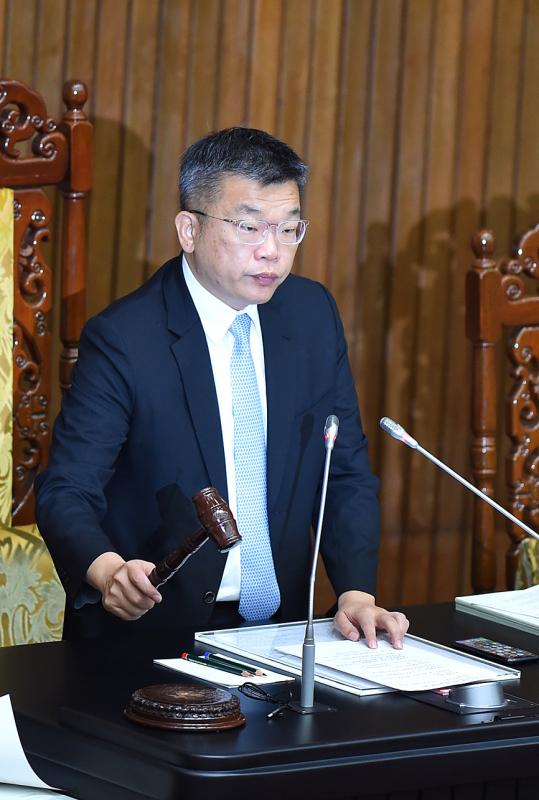The Legislative Yuan yesterday passed amendments to the Seafarers Act (船員法) that would require the owner of a vessel to obtain the crew’s written consent before a ship not protected by armed contractors sets sail in waters threatened by piracy or other unlawful forces.
Article 87 of the act stated that the owner of a vessel must obtain the written consent of the crew to operate the ship in a war zone. The amendment expands that requirement to waters threatened by piracy and illegal armed forces.
Democratic Progressive Party (DPP) Legislator Liu Chao-hao (劉櫂豪), who proposed the amendment, said that piracy and maritime terrorism are increasingly common, even as wars at sea are on the decline.

Photo: Liu Hsin-de, Taipei Times
Multiple attacks on shipping by armed African groups have been reported, including some vessels owned by Taiwanese companies, causing distress to crew members and their families, the bill’s statement of purpose says.
Additionally, insurance companies are demanding higher premiums, and there are additional costs for security measures, extra fuel and contributions to ransom payments, which would all be transferred to Taiwanese consumers, it says.
The Seafarers Act should therefore treat piracy as equivalent to war, especially after 2013 amendments to the Shipping Act (航業法) and the Fisheries Act (漁業法) that mandated owners to adopt anti-piracy security measures, it added.
The amendments make the owners of vessels liable for deaths, injuries or harm suffered by the crew due to warfare or piracy.
Meanwhile, legislators yesterday also passed amendments to the Act for Settlement of Labor-Management Disputes (勞資爭議處理法) whereby the Board for Decision on Unfair Labor Practices would have to include one to three standing members, while increasing the transparency of its rulings.
DPP Legislator Liu Chien-kuo (劉建國), Taiwan People’s Party caucus whip Lai Hsiang-ling (賴香伶) and Chinese Nationalist Party (KMT) Legislator Chiang Wan-an (蔣萬安) had separately submitted bills to amend the act.
Following cross-caucus negotiations, the bills were merged and passed, resulting in amendments to Article 43 and Article 47 of the act.
Article 43 has been amended so that the board must consist of one to three standing members among its total membership of seven to 15 experts in labor law.
The standing members would increase the board’s efficiency and professionalism, as well as protecting workers’ right to organize and join a union, and to bargain collectively, the bill says.
Article 47 has been amended to allow the board to publish its rulings on the Internet or another appropriate platform without any unnecessary censorship.
Transparency should be the guiding principle in publishing the board’s rulings so that the public can understand the legal guidelines underlying employment practices, the bill says, adding that the verdicts should not be censored except for personal information.
Plaintiffs’ and defendants’ wishes should be given less weight than the public interest when disseminating information about the Labor Union Act (工會法) and the Collective Agreement Act (團體協約法), the bill says.

People can preregister to receive their NT$10,000 (US$325) cash distributed from the central government on Nov. 5 after President William Lai (賴清德) yesterday signed the Special Budget for Strengthening Economic, Social and National Security Resilience, the Executive Yuan told a news conference last night. The special budget, passed by the Legislative Yuan on Friday last week with a cash handout budget of NT$236 billion, was officially submitted to the Executive Yuan and the Presidential Office yesterday afternoon. People can register through the official Web site at https://10000.gov.tw to have the funds deposited into their bank accounts, withdraw the funds at automated teller

PEACE AND STABILITY: Maintaining the cross-strait ‘status quo’ has long been the government’s position, the Ministry of Foreign Affairs said Taiwan is committed to maintaining the cross-strait “status quo” and seeks no escalation of tensions, the Ministry of Foreign Affairs (MOFA) said yesterday, rebutting a Time magazine opinion piece that described President William Lai (賴清德) as a “reckless leader.” The article, titled “The US Must Beware of Taiwan’s Reckless Leader,” was written by Lyle Goldstein, director of the Asia Program at the Washington-based Defense Priorities think tank. Goldstein wrote that Taiwan is “the world’s most dangerous flashpoint” amid ongoing conflicts in the Middle East and Russia’s invasion of Ukraine. He said that the situation in the Taiwan Strait has become less stable

CONCESSION: A Shin Kong official said that the firm was ‘willing to contribute’ to the nation, as the move would enable Nvidia Crop to build its headquarters in Taiwan Shin Kong Life Insurance Co (新光人壽) yesterday said it would relinquish land-use rights, or known as surface rights, for two plots in Taipei’s Beitou District (北投), paving the way for Nvidia Corp to expand its office footprint in Taiwan. The insurer said it made the decision “in the interest of the nation’s greater good” and would not seek compensation from taxpayers for potential future losses, calling the move a gesture to resolve a months-long impasse among the insurer, the Taipei City Government and the US chip giant. “The decision was made on the condition that the Taipei City Government reimburses the related

FRESH LOOK: A committee would gather expert and public input on the themes and visual motifs that would appear on the notes, the central bank governor said The central bank has launched a comprehensive redesign of New Taiwan dollar banknotes to enhance anti-counterfeiting measures, improve accessibility and align the bills with global sustainability standards, Governor Yang Chin-long (楊金龍) told a meeting of the legislature’s Finance Committee yesterday. The overhaul would affect all five denominations — NT$100, NT$200, NT$500, NT$1,000 and NT$2,000 notes — but not coins, Yang said. It would be the first major update to the banknotes in 24 years, as the current series, introduced in 2001, has remained in circulation amid rapid advances in printing technology and security standards. “Updating the notes is essential to safeguard the integrity